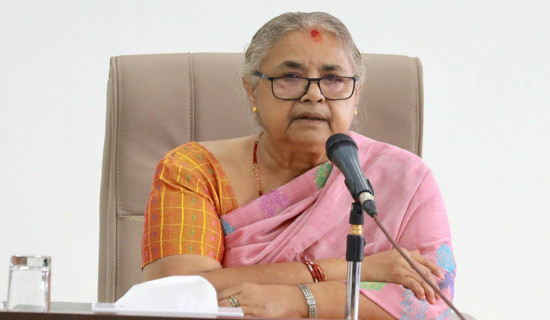- Thursday, 12 February 2026
Wider Social Security
Nepal has taken significant steps to enhance the social security of the people despite the fact that the country’s economic conditions are far from satisfactory. Nepal’s constitution has stipulated scores of political, economic, social, employment and health rights, obliging the state to make institutional efforts to ensure the social security of the people. However, it has been a formidable task for the successive governments to translate the vision of the statute into action due to the weak tax base. For a nation to have a solid social security scheme, the contribution of tax to the national GDP should be comparatively high. But the average tax-to-GDP ratio has been 13.92 per cent in the last 21 years. In 2023, the share of tax to the GDP stood at around 17 per cent.
Nonetheless, Nepal’s bid to create a welfare state has not been crimped by the unpromising economic scenario. In 2018, the country launched contribution-based Social Security Fund (SSF) to provide benefits to the formal workers. It has been gradually extended to incorporate informal and migrant workers, self-employed and those working in the construction field. As of October 2024, there are around 999,806 registered contributors and 19,519 registered employers. Under the SSF, the contributors have the benefits of medical treatment, health and maternity protection, accident and disability protection, dependent family and old age protection.
A large segment of informal workforce is still out of the SSF framework. According to Nepal Economic Forum, the total number of employed persons is 7.1 million. Of them, 6 million (84.6 per cent) are informal workers. So there is a huge challenge to formalise the informal economy that approximately contributes 42. 66 per cent to the national GDP. The SSF's another enormous difficulty lies in bringing the migrant workers into its ambit. Out of five million migrant Nepali workers, only 1.2 million are enrolled in it and still fewer are regularly contributing to it.
Amidst the growing challenges, the SSF marked the 7th Social Security Day on Tuesday. Addressing a function organised to mark the occasion, Prime Minister KP Sharma Oli announced that contributors' children would also receive benefit from the fund within 90 days from now and contributors requiring medical treatment costing over Rs. 100,000 would receive 50 per cent of the expenses from the SSF. Likewise, Minister for Labour, Employment and Social Security, Sarat Singh Bhandari informed that the Ministry was working to link the temporary and contract employees in the public services to the Fund and urged the private sector not to hesitate to get affiliated with the SSF for it covers the social and economic risks of their employees. The private sector that provides 85 per cent of employment needs to be the part of the SSF.
It is indeed a positive step to expand the scope of the SSF. More needs to be done to make it inclusive and effective. Now it must not delay in unveiling the concrete plans and programmes to incorporate more migrant and informal labourers into it. The government should also bring policies to mobilise the fund deposited in the SSF in the productive sectors to generate employment opportunities. The SSF programmes aim to realise the universal social security concept and guarantee the constitutional rights of contribution-based social security. Its commitment to establish itself as the component of equitable and socialism-oriented economy is praiseworthy but time has come to turn these pledges into reality.

















